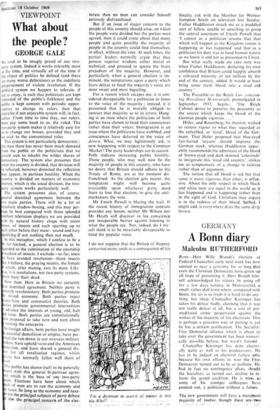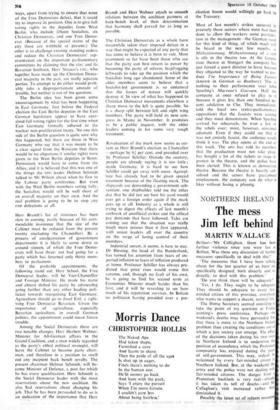GERMANY
A Bonn diary
Malcolm RUTHERFORD
Bonn—Herr Willy Brandt's election as Federal Chancellor early next week has now seemed so near a certainty for so long that even the Christian Democrats have given up all hope of preventing it. Herr Brandt him- self acknowledged his victory by going off for a few days holiday in Miinstereifel, a small, rather dull town where, compared with Bonn, the air is so fresh it is hard to do any- thing but sleep. Chancellor Kiesinger has taken his defeat badly, claiming that it was not really defeat at all, but a sort of pre- meditated crime perpetrated against the wishes of the majority of the electorate. This is perhaps a graceless way of putting it, yet he has a certain justification. The Socialist- Free Democrat alliance which is about to take over the government has been numeri- cally possible before, but wasn't formed.
Chancellor Kiesinger has done elector- ally quite as well as his predecessors. He has to be judged an electoral failure only because his own efforts to woo the Free Democrats turned out to be so pathetic. He had in fact no contingency plans, should the Socialists, as turned out, decline to re- form the grand coalition. He is now, as some of his younger colleagues have pointed out, a politician without a future.
The new government will have a maximum majority of twelve, though• there are'tI
ways, apart from trying to ensure that none of the Free Democrats defect, that it could try to improve its position. One is to give full voting rights to the deputies from West Berlin, who include fifteen Socialists, six Christian Democrats, and one Free Demo- crat. (Because of the special status of the city these are withheld at present.) The other is to challenge existing standing orders and reduce the Christian Democrats' rep- resentation on the important parliamentary committees by claiming that the CDU and its.. Bavarian brethren, Herr Strauss's csu, who together have made up the Christian Demo- crat majority in the past, are really separate parties. To attempt to do either would prob- ably take a disproportionate amount of trouble, but neither is out of the question.
The Berlin idea has been given some encouragement by what has been happening in East Germany. Just before the Federal election the East Berlin deputies in the East German legislature appear to have exer- cised full voting rights for the first time when East Germany formally adhered to the nuclear non-proliferation treaty. No one this side of the Berlin question is quite sure why this happened, but there are those in West Germany who say that it was meant to be a clear signal from the Russians that there would be no objections if similar rights were given to the West Berlin deputies in Bonn. Permission would have to come from the Allies, and it is believed that this was one of the things the SPD leader Helmut Schmidt talked to Mr Wilson about when he flew to the Labour party conference. But even with the West Berlin members voting fully, the Socialists would still be well short of an overall majority on their own. And the real problem is going to be to stop any FDP defections at all.
Herr Brandt's list of ministers has been slow in coming, partly because of his com- mendable insistence that the size of the Cabinet must be reduced from the present twenty (including the Chancellor). By a process of amalgamation of government departments it is likely to come down to around sixteen, of which the Free Demo- crats will have three: not bad going for a party which has feturned only thirty mem- bers to parliament.
Of the probable appointments, the following stand out. Herr Scheel, the Free Democrat leader, will be Vice-Chancellor and Foreign Minister. He made his name and almost dished his party by advocating going further than any other leading poli- tician towards recognising East Germany. Agriculture should go to Josef Ertl. a right- wing Free Democrat Bavarian. Given the importance of agriculture, especially Bavarian agriculture, in overall German politics, the appointment could mean future trouble.
Among the Social Democrats there are two notable changes. Herr Herbert Wehner, Minister for All-German affairs in the Grand Coalition, and a man widely regarded as the party's ablest political strategist, will leave the Cabinet to become party chair- man, and therefore in a position to smell out any incipient back bench revolts. The present chairman Helmut Schmidt, will be- come Minister of Defence, a post for which he has every qualification. Herr Schmidt is the Social Democrat leader with the most reservations about the new coalition. He also had reservations about changing his job. That he has been persuaded to do so is an indication of the importance that Herr
Brandt and Herr Wehner attach to smooth relations between the coalition partners at back-bench level, of their determination that harmony shall prevail for as long as possible.
The Christian Democrats as a whole have meanwhile taken their imposed defeat in a way that might be expected of any party that has come to believe it is born to rule. Most prominent so far have been those who say that the party can best return to power by becoming the party of reform, leapfrogging leftwards to take up the position which the Socialists long ago abandoned. Some of the older members seem to believe that a Socialist-led government is so unnatural that the forces of nature will quickly destroy it. In view of what has happened to Christian Democrat movements elsewhere a sharp move to the left is quite possible. So is a sharp split between left and right wing members. The party will hold its next con- gress in Mainz in November. It promises to be a public inquest, with the older leaders coming in for some very rough treatment.
Revaluation of the mark now seems as cer- tain as Herr Brandt's election as Chancellor —perhaps by 61 per cent, and presided over by Professor Schiller. Outside the country, people are already saying it is too little ; inside Germany, it is hard to see how Schiller could get away with more. Agricul- ture has already had to be given special treatment because of the floating mark. The shipyards are demanding a government sub- vention: one shipbuilder told me the other day that he did not see how his yard would ever get a foreign order again if the mark goes up at all. Industry as a whole is still trying to digest the effects of last month's outbreak of unofficial strikes and the offical pay demands that have followed. Tales are coming out that the situation was really much more serious than it first appeared, with union leaders all over the country on the verge of losing control of their members.
Industrial unrest, it seems, is here to stay. Dr Blessing, the head of the Bundesbank, has turned his attention from fears of im- ported inflation to fears of inflation produced at home. Professor Schiller has always pre- dicted that price rises would come this autumn, and, through no fault of his own, he is going to find his second term as Economics Minister much harder than his first, and it will be revealing to see how much of his reputation survives. In Britain no politician having presided over a pre-
election boom would willingly go back to the Treasury.
Most of last month's strikes occurred in precisely those sectors where most had been done to allow the workers some participa- tion in the management—the German word for this kind of thing, of which much will be heard in the next few months, is Mitbestimmung. Mitbestimmung of a sort is rife in the theatre too. At the famous state theatre in Stuttgart the company has just forced a guest director to leave because they objected to the way he wanted to pro- duce The Importance of Being Earnest (known in German as Bunbury). This is nothing to their performance over John Spurling's Macrune's Guevara. Half the company at once refused to play in it because it gives less than one hundred per cent adulation to Che. They immediately told the local Apo (extra-parliamentary opposition) that the fascists were coming and they must demonstrate. When Spurling arrived for rehearsals, he won a few of the rebels over; most, however, remained adamant. Even if they could see that it was not entirely fascist, the audience would think it was. The play opens at the end of this week. The Apo has told its members that the production must not take place, has bought a lot of the tickets to stage its protest in the theatre, and the police have been alerted. This is known as democratic theatre. Because the theatre is heavily sub- sidised and the actors have guaranteed employment, the company can do what it likes without losing a pfennig.



































 Previous page
Previous page